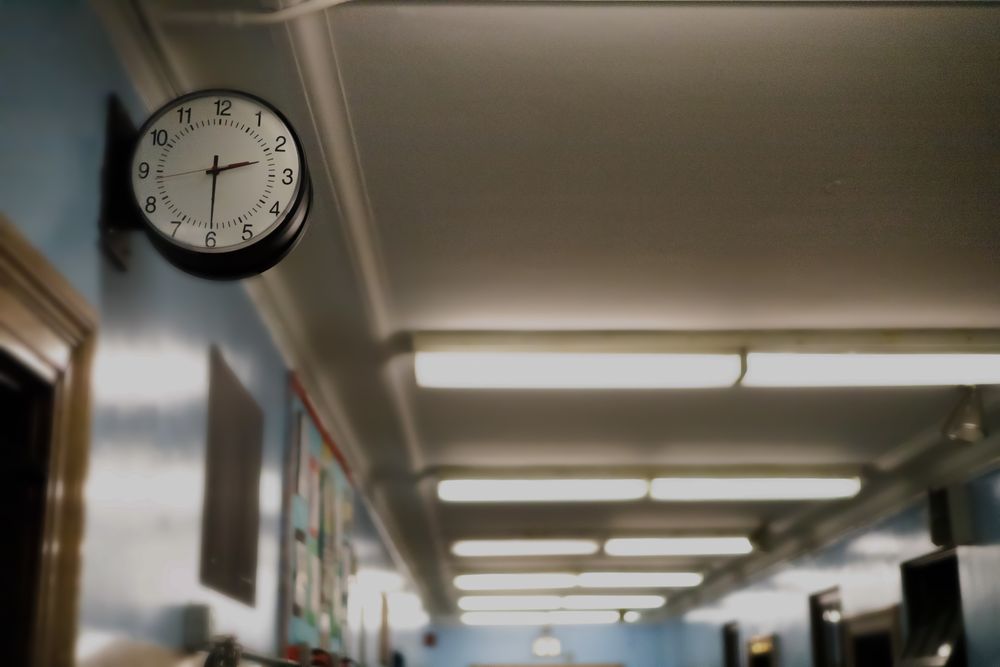One of the first thoughts you have as a parent when it happens—the dark, hopeless thought you will try to push away for the next awful minutes or hours—is this one: "Is it our turn now?"
It's one of hundreds of what-if and why-us questions your brain will pose after you get the text notification from your kid's school that says, with terrifying vagueness, "Lockdown has been issued. Police are onsite to assess the situation."
Your mind goes to Sandy Hook. Back all the way to Columbine. It will now go to Nashville on its way back to Uvalde. You will imagine all the awful outcomes and see your child's face—you hope a face you could still recognize—and pray you are lucky one more time.
In early September, just as the new school year was getting back in gear, an anonymous call about a possible shooter threat triggered a large law-enforcement response at my daughter's high school, one that extended to other schools in the district, including my younger daughter's middle school. That afternoon, they were both in lockdown for hours.
My two daughters, one at high school, one at middle school, are both locked in. My younger daughter hiding in a bathroom texted my older daughter, under a desk, to see if she was ok. This is America. This is Texas.
— Omar L. Gallaga (@omarg) September 8, 2022
The end of the previous school year, at an elementary school only two hours away from where my daughters were hiding, was when Robb Elementary's 21 victims were killed. Uvalde was fresh on everyone's mind, which might be why more than 100 police officers ended up at my daughter's high school, trying to find evidence of a live shooter situation.
I was sitting at a Target, waiting for my Covid booster appointment at their CVS storefront, refreshing my phone for any sign on Twitter or in texts or in emails to see if there was any new news. For a while, there was nothing, just me sending the information I had to my parents. To my kids' mom. To social media, in case any other local parents might see it and share what was happening.
The way it feels to have a kid in lockdown is to have the knot of fear and helplessness implanted into your gut. It sets roots there and doesn't go away.
Like any parent might, I thought about getting in my car and driving to the school, to stand out there with other parents in the September heat and await word. But I knew from updates online that the highway loop running next to the school was already blocked off. Police weren't letting any cars in or out. I would just be sitting in traffic, unable to get there. So I stayed put and waited and waited. And waited.
Both of my daughters have cell phones; my younger daughter had just gotten her first one over the summer. After an agonizing wait with no news from the school, and no messages returned from my kids, my 15-year-old wrote: "Sorry I just got my phone. I'm still under a desk."
"Oh god I'm sorry," I wrote back.
"Apparently there's a dude with a gun but no one has gotten hurt. And some people are being evacuated."
"How do you know?" I asked. Even with my brain on my fire and my heart racing, I was fact-checking like a journalist.
"My friends mom. I don't know," my daughter wrote back.
She said there were rumors of helicopters circling around the school. She said she thought she might have heard them.
By now, my younger daughter was responding. "Your sister is safe, she's texting me," I told her.
"Yeah I was in the bathroom texting her earlier," she wrote back.
When I posted online, I heard from parents from all over the country, telling me how sorry they were that we were going through it, sharing their own stories, expressing their fear and hope. They've gone through it, too. They know how this feels.
At almost 4 p.m., my kids were still in lockdown. Some students were evacuated out of windows and moved out to the open-air football stadium, which seemed incredibly unsafe to me. But by that point, it seemed clear that the active-shooter rumors were untrue, and that the anonymous caller, a teenager, gave false information.
That should be comforting for a parent. Your kid was safe the whole time. They dodged a bullet—unfortunate pun unintended—once again. But it's not comforting at all. Because you know it'll happen again. And again. For probably as long as your kids are in K-12 school, and then more times when they are on a college campus, which is no safer.
In January, we had another lockdown, triggered by a similar tip. The response was smaller; the incident wound down faster, almost as if this was becoming more routine.
It's not comforting to think of your kid hiding under a desk or in a bathroom, of children whispering rumors about what danger might be just outside the walls and windows. When my kids were much smaller, in elementary school, they had lockdowns and active-shooter drills. What seems horrifying and traumatizing to those of us who didn't grow up with those is now routine to kids. The trauma belongs to them and there seems little anyone is willing to do about it but keep perpetuating fear, the fear of the cycle of violence that only gets worse every school year.
The way it feels to have a kid in lockdown—to not know for minutes or hours or minutes that feel like hours whether your son or daughter will return home unharmed—is to have the knot of fear and helplessness implanted into your gut. It sets roots there and doesn't go away; the knot just waits for the next incident, hoping that your kid is lucky one more time and that the luck doesn't one day run out.
More From LEVEL:
